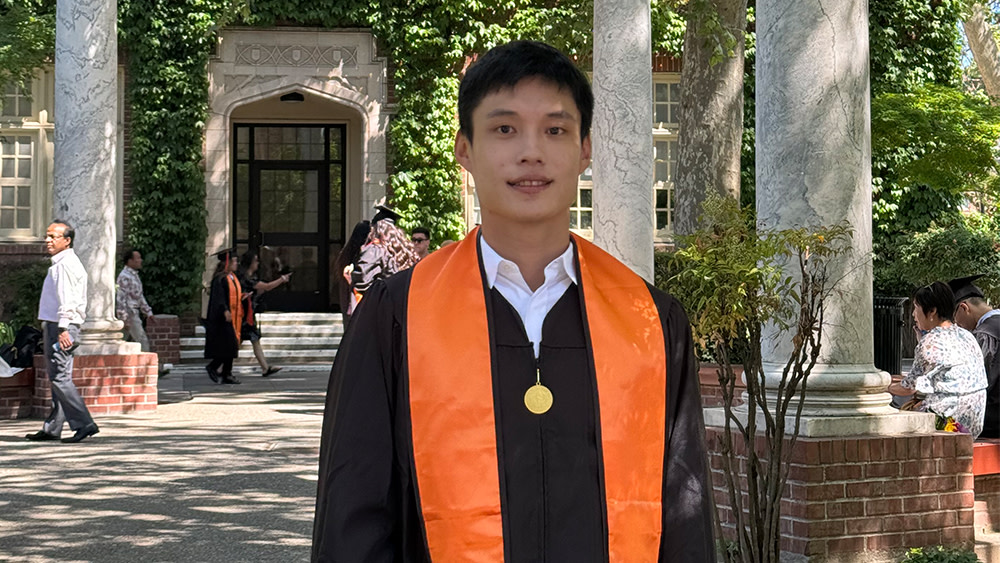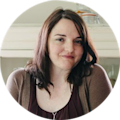In January 2022, Ming-Hao (also known as Howard) left his home in Taiwan with a clear goal in mind: He would pursue a master’s degree in computer science at the University of the Pacific and find a way to build a career in the US tech industry. Just over two years later, Howard landed his dream role as a software engineer at Google, after a journey fueled by determination, late nights of coding, and a deep passion for learning.
Why the University of the Pacific?
Howard didn’t start his academic path in computer science. “I gained hands-on experience with coding during a previous job in Taiwan,” he said. “That significantly sparked my interest in computer science. It was a turning point for me and led to my decision to pursue a master’s [degree] in the field.”
When deciding where to study for his graduate degree, Howard chose the University of the Pacific for several reasons. “As a transfer student, I was particularly drawn to their computer science program’s reputation for its strong curriculum and practical approach, which notably accommodates students, like myself, from non-computer science backgrounds pursuing a master’s degree,” he said.
“The curriculum at Pacific emphasized problem-solving and understanding complex systems, which are directly applicable to industry-related and real-world problems,” Howard said.
Several classes that were instrumental to Howard’s success included “the Computer Fundamentals course … [and] high-level courses such as Advanced Algorithms and Computational Theory.”
For Howard, another unique selling point of the University of the Pacific was “the personalized attention from professors, smaller class sizes, and a strong sense of community,” he said.
“I was impressed by the faculty’s expertise and the university’s commitment to supporting international students, which was a significant consideration for me,” he added. “I also found that Pacific’s career services and alumni network were very active in supporting students, which was a major plus.”
Mentorship and Campus Life
In addition to his studies, Howard made a point to participate in activities outside of the classroom. “I served as a core committee member of the Google Developers Student Club, where I helped organize workshops and events.”
He also completed two internships while studying at Pacific. “The first was at the UOP Library Cube Lab as a developer,” he explained. “The second was as a software developer at Capital Tech Solutions. These experiences gave me hands-on skills and exposure to real-world projects.”
Howard also had help along the way, and is particularly grateful to “Professor Chadi, Professor Gao, and Professor Houman. Their invaluable advice and inspiring guidance were instrumental in my learning and career development.”
The Road to Google
Landing a role at Google is an extraordinary achievement for any student, but Howard never lost sight of the goal despite navigating OPT and visa complexities.
“Google has always been my dream company,” he said. “I’ve long admired their innovative approach to technology and their impact on the global landscape.”
He approached the job search with three key factors in mind. “My strategy centered on preparation, networking, and persistence,” Howard explained.
To prepare, Howard “dedicated significant time to mock interviews and coding problem-solving. This involved practicing common algorithms and data structures on platforms like LeetCode and participating in mock interviews with peers and mentors. This helped me hone my technical skills and develop effective strategies for tackling coding challenges under pressure.”
When it came to networking, Howard “attended career fairs, industry events, and online webinars to connect with recruiters and professionals.” He “also leveraged LinkedIn to expand my professional network and seek advice from individuals who had successfully navigated the job market as international students.” It was “these connections [that] proved invaluable in learning about opportunities and gaining insights into company cultures.”
Finally, Howard “understood that securing a role in big tech as an international student required persistence and resilience, and I remained committed to my goal even in the face of rejections.” He did this by “regularly research[ing] companies, tailor[ing] my resume and cover letters for each application, and stay[ing] updated on industry trends.”
Inside the Google Interview Process
The interview process at Google is famously rigorous, and Howard underwent “an HR interview … followed by three rounds focused on coding, testing my knowledge of algorithms and data structures. Finally, there was a behavioral interview round, which included ‘Googliness’ questions designed to assess my cultural fit and problem-solving approach.”
To prepare, Howard “primarily focused on mastering algorithms and data structures, as well as thoroughly understanding the types of questions asked in the behavioral and Googliness rounds.”
It was the people, however, in Howard’s life who had the biggest impact on the process. “Beyond mock interviews, the primary resources that helped me succeed were the supportive network of referrals I cultivated, and the unwavering encouragement from my family. Their belief in me and their practical assistance, whether it was through mock interviews or emotional support, played a crucial role in my success,” he said.
Overcoming Challenges as an International Student
Like many international students navigating OPT, Howard faced several challenges. “Firstly, the language barrier was a significant hurdle,” he admitted. “Effectively communicating in a professional setting required constant effort.”
Then there was the uncertainty around visa sponsorship. “The job market is already competitive, and needing sponsorship can make it even more challenging to secure opportunities,” he said, [which could often feel] “unfair given the talent international students bring.”
Fortunately, the University of the Pacific’s International Programs and Services (IPS) team offered vital support. “They provided invaluable guidance on immigration regulations and work authorization, ensuring I understood all the requirements and deadlines,” Howard noted. “IPS also offered workshops and resources specifically tailored to international students seeking employment, which helped me navigate the job search more effectively. Their team was always available to answer my questions and provide reassurance, making a complex process feel much more manageable.”
Starting at Google: A Dream Realized
Howard is beginning his new chapter as a software engineer at Google, where he will make contributions to the Google Workspace team to “improve the availability, scalability, latency, and efficiency of customer-facing products,” he explained. “I’ll solve problems for mission-critical services, build automation to prevent recurrence, and automate responses to non-exceptional service conditions.”
Howard will also have the opportunity to “influence new designs, architectures, standards, and methods for large-scale distributed systems; engage in capacity planning; demand forecasting, performance analysis, and system tuning; and participate in periodic on-call duties.”
When asked about what excites him most, Howard didn’t hesitate. “I am most excited about the opportunity to contribute to Google’s innovative projects and collaborate with a team of brilliant engineers. I’m eager to learn from the best and apply my skills to real-world challenges that impact millions of users globally,” he said.
Advice for Future International Students
When asked for advice to give other international students hoping to be hired by top tech firms, Howard recommended:
Starting early. “Research companies and their hiring timelines, then proactively tailor applications to specific roles.”
Mastering the basics. “Strong technical skills are paramount; master algorithms, data structures, and programming languages through consistent practice and participation in hackathons.”
Networking strategically. “Attend career fairs, industry events, and webinars, leveraging LinkedIn for connections and advice.”
Tailoring your resume and cover letter. “Customiz[e] each application and quantify [your] achievements.”
Practicing interviews. “Prepare rigorously for technical and behavioral interviews through mock sessions, [and be] ready to articulate your problem-solving.”
Being persistent and resilient. “Learn from rejections and maintain a positive mindset for success.”
When encountering setbacks, Howard “stay[ed] motivated by remembering my goals and the hard work I’ve already put in. I view setbacks and rejections not as failures, but as opportunities to learn and improve. Each ‘no’ brings me closer to a ‘yes,’ and I focus on what I can control: my effort, my learning, and my persistence,” he said.
If he could go back in time to the start of his program, Howard’s one piece of advice would be “to start networking and practicing for interviews much earlier. Building connections and honing technical skills consistently throughout my studies would have made the job search process less stressful and more efficient.”
A Personal Victory
Through setbacks and cultural adjustments, Howard never wavered in his ultimate goal. His journey is proof that international students can thrive in, innovate for, and make meaningful contributions at the world’s most competitive tech companies.
“Starting my career at Google is a dream come true and a profound honor,” Howard said. “It signifies the culmination of years of hard work, dedication, and unwavering passion for technology.”
Howard acknowledges that “beyond the prestige, it represents an incredible opportunity to contribute to projects that impact billions of lives globally, to learn from the brightest minds in the industry, and to constantly push the boundaries of what’s possible. It’s a validation of my journey as an international student and a testament to the support I’ve received along the way.”
Discover the University of the Pacific >

